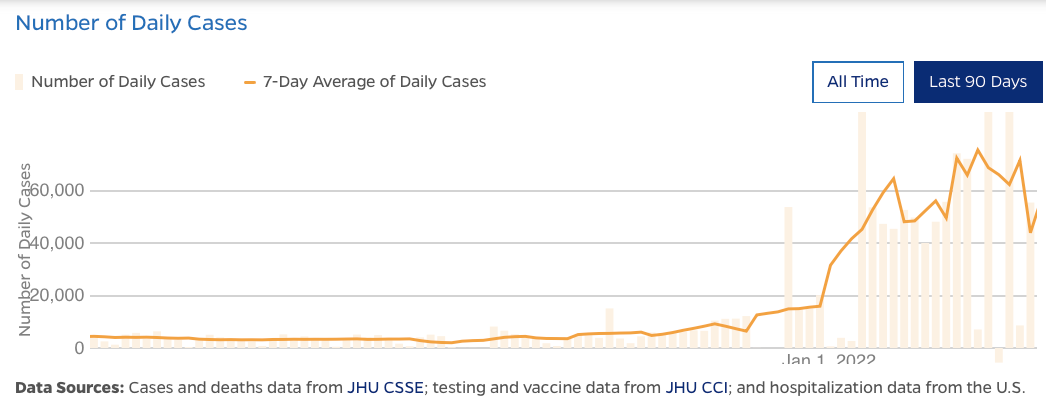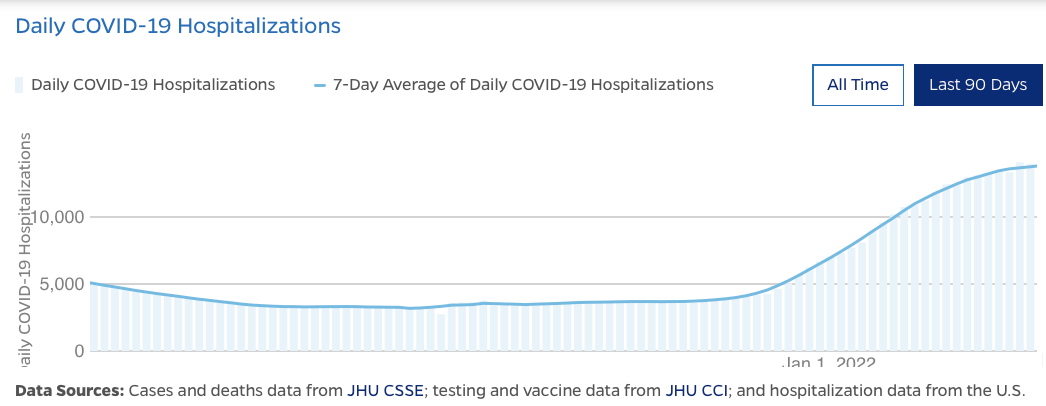1. Why Y’all Making Me Hide in My House?
There’s a great scene at the beginning of Men in Black II. Agent J (Will Smith) is trying to corral a huge alien worm that is eating a New York subway train. He rescues all the passengers, then neuralyzes them to erase their memory of the incident. He tells them, “Thank you for participating in our drill. Had this been an actual emergency,” … losing his temper … “y'all would have been EATEN. 'Cause you don't listen. You're ignorant.”
Here is the chart of new COVID-19 cases in Texas in the last 90 days:
Here is the chart of COVID-19 hospitalizations in the last 90 days:
And here is the chart of COVID-19 vaccinations in the last 90 days: [1]
For those of you not in the chart-reading business, the numbers of new cases and hospitalizations in Texas have risen dramatically in the last 90 days, but the number of folks getting vaccinated remains flatlined. So, while those of us paying attention read and hear about ICUs filled to capacity, others blithely go on about their lives, perhaps even annoyed by the jerks who insist on wearing masks in public places.
2. Bon Voyage, Sarah Weddington. Bon Voyage, Roe?
Today is the 49th anniversary of the Supreme Court decision in Roe v. Wade. It is also almost a month since Sarah Weddington, the brilliant young lawyer who argued the case before the Court, passed away.
Since the late 1970s, the Roe anniversary has occasioned a big hullabaloo in Washington D.C. and other cities around the country. The so-called “pro-lifers” argue that life begins at the moment of conception and thus abortion amounts to murder. They have created a whole industry of opposition to Roe, and they may be about to get their wish.
On December 1, the Supreme Court heard oral argument in Dobbs v. Jackson Women’s Health Organization, challenging a Mississippi law designed specifically to give the Court’s new conservative majority a chance to overrule Roe. While it is never wise to predict what the Court will do, many fearSCOTUS will overrule the 50-year old precedent.
Sarah Weddington, as they say, dined out on winning Roe for the rest of her career. She served three terms in the Texas Legislature (she’d been elected while Roe was pending) and taught and spoke publicly for the rest of her life. She was a mentor and guide to two generations of young women.
I met her in 1991, shortly after I’d gone to work for Governor Ann Richards. I received a call one day saying that Ms. Weddington wanted to meet me. Being relatively new to the Richards tribe, I was enormously flattered and quickly set a time for our visit. When we met, I was dazzled by her preparation; she knew as much about me as it was possible to know in those pre-Google days.
It turned out she wanted to talk about insurance. She’d been hired by a major insurance company to monitor the insurance reforms Ann was proposing. Once again, I was impressed with her knowledge of solvency standards, claims handling procedures and other arcana. We had a cordial, informative discussion, but it was the only time we visited about insurance reform. To be honest, I never thought her heart was in it.
Over the succeeding years, we ran onto each other from time to time. I always knew I was in the presence of a Texas hero. Mimi Swartz said it perfectly in her tribute to Ms. Weddington:
Weddington was for much of her life part of a coterie of outspoken Texas women who had grown up in a state that was, as the cliché went, hard on women and horses. [They] were smart, clever, and perpetually pissed off about the limits placed on their talents, their abilities, and their dreams. They understood that until women had positions of power, they could never change the status quo, and so spent their lives, hands on hips, getting themselves and their kind into legislatures and law firms and back rooms where they could make a difference.
3. “The Road Less Traveled,” or “The Road Not Taken?”
Since I was a callow youth – and I am no longer a youth – I have loved the Robert Frost poem about roads diverging in a yellow wood. I recently had the opportunity to recite the poem in a crowded bar in Alpine, Texas, which I did with some pizzazz and probably a 95% accuracy rate. I introduced it as “The Road Less Traveled,” which to me summarizes the idealistic impulse at the end of the poem:
“I took the road less traveled by,
And that has made all the difference.”
A dear friend of mine happened to be in that audience, and she pointed out last night that the poem’s actual title is “The Road Not Taken.” She said that the road “less traveled” and the road “not taken” are, by the terms of the poem, two different roads, and what the hell was I trying to pull over on an unsuspecting public?
Using all the savoir faire I’d acquired as a high school teacher, I patiently tried to explain to her the deeper meaning of the poem until it became obvious even to me that I did not know what I was talking about. Neither do most of us. I gave up when one source suggested understanding the poem through the lens of a 19th century logician.
In the end, we decided not to parse “The Road Not Taken” at a subatomic level. e. e. cummings summarizes my attitude:
since feeling is first
who pays any attention
to the syntax of things
will never wholly kiss you;
We’ll proceed to sharpen our love for good language by reading a book or two. Any suggestions for good fiction?
[1] All charts from https://coronavirus.jhu.edu/region/us/texas.







This is a refreshing post and brings perspectives on how the struggles continue. Your experiences and memories are fascinating. Keep them coming!